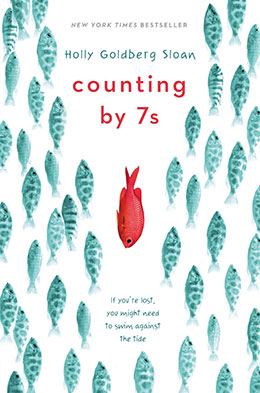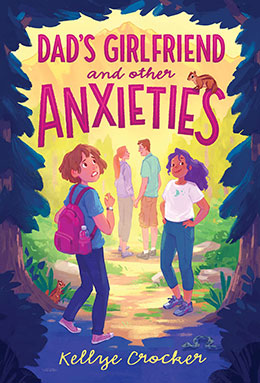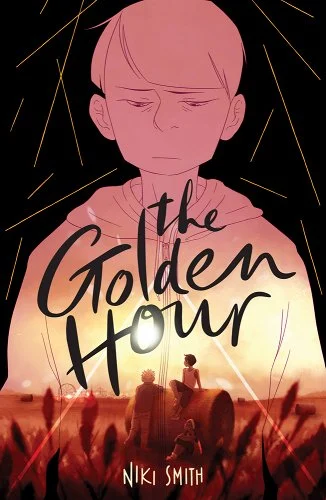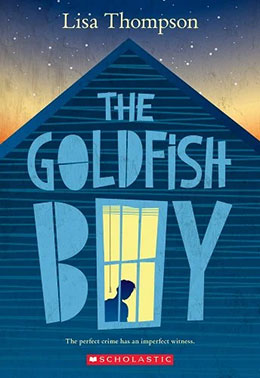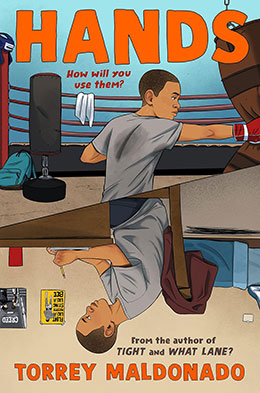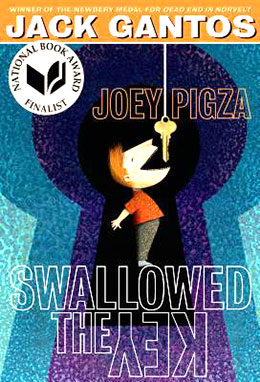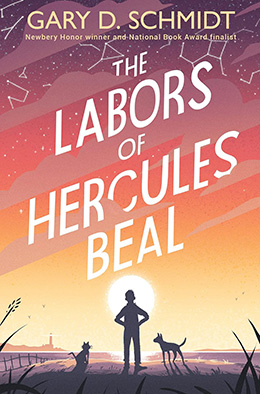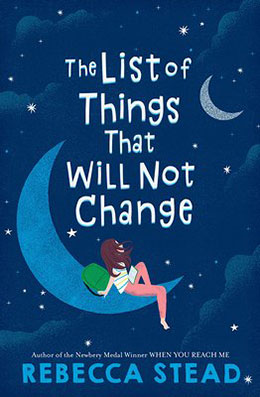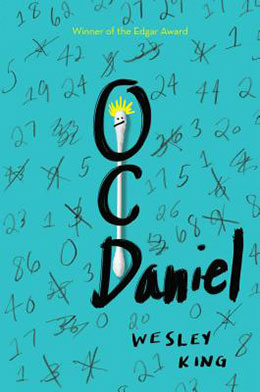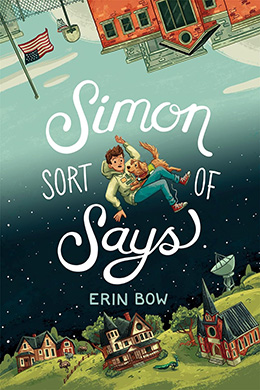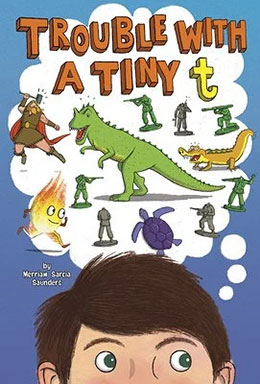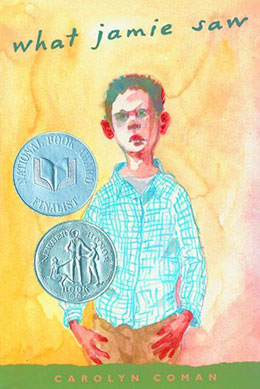Ann Jacobus and Nancy Bo Flood, authors and educators, developed this list of picture books with mental health as a focus. They are maintaining it, so if you have suggestions, please let us know in the comments. Ann and Nancy are available for workshops on this important topic for librarians, educators, and mental health organizations. Ann Jacobus. Nancy Bo Flood.
More Books about Mental Health: Family Mental Health Middle Grade • Grief • LGBTQ Middle Grade • Nonfiction • Picture Books
NOVELS
Counting by Sevens
written by Holly Goldberg Sloan
Roaring Brook Press, 2017
(presumed autism)
Willow Chance is a twelve-year-old genius, obsessed with nature and diagnosing medical conditions, who finds it comforting to count by 7s. It has never been easy for her to connect with anyone other than her adoptive parents, but that hasn’t kept her from leading a quietly happy life … until now.
Suddenly Willow’s world is tragically changed when her parents both die in a car crash, leaving her alone in a baffling world. The triumph of this book is that it is not a tragedy. This extraordinarily odd, but extraordinarily endearing, girl manages to push through her grief. Her journey to find a fascinatingly diverse and fully believable surrogate family is a joy and a revelation to read.
Dad’s Girlfriend and Other Anxieties
written by Kellye Crocker
Albert Whitman, 2022
(anxiety)
Anxiety has always made Ava fearful of change, but plunging headfirst into a new situation might be just what she needs.
Dad hasn’t even been dating his new girlfriend that long, so Ava is sure that nothing has to change in her life. That is, until the day after sixth grade ends, when Dad whisks her away on vacation to meet The Girlfriend and her daughter in terrifying Colorado, where even the squirrels can kill you! Managing her anxiety, avoiding altitude sickness, and surviving the mountains might take all of Ava’s strength, but at least this trip will only last two weeks. Right?
The Dreamway
written by Lisa Papademetriou
HarperCollins, 2018
(depression)
Every night, your sleeping body stays in your bed, while the you of you travels deep beneath the earth to ride the complex rails of the Dreamway….
Stella Clay thought it was just another ordinary day at her drab gray school. Then her twin brother, Cole, is attacked by a shadowy creature on their way home, and Stella’s world turns positively peculiar. Suddenly, her brother seems different, almost dimmer, like a candle about to flicker out.
And then a talking mouse shows up in her bedroom.
Stella discovers that the real Cole has been taken prisoner in the Dreamway. Determined to find him, she sets out with the “help” of a stuck-up rodent, a nervous dragonfly, and a mysterious pirate, and finds her way to the darkest edge of the Dreamway to bring her brother home … before he’s trapped forever.
Finding Perfect
written by Elly Swartz
Farrar, Straus & Giroux, 2016
(obsessive compulsive disorder, OCD)
To twelve-year-old Molly Nathans, perfect is:
- The number four
- The tip of a newly sharpened No. 2 pencil
- A crisp white pad of paper
- Her neatly aligned glass animal figurines
What’s not perfect is Molly’s mother leaving the family to take a faraway job with the promise to return in one year. Molly knows that promises are sometimes broken, so she hatches a plan to bring her mother home: Win the Lakeville Middle School Poetry Slam Contest. The winner is honored at a fancy banquet with white tablecloths. Molly is sure her mother would never miss that. Right…?
But as time passes, writing and reciting slam poetry become harder. Actually, everything becomes harder as new habits appear, and counting, cleaning, and organizing are not enough to keep Molly’s world from spinning out of control. In this fresh-voiced debut novel, one girl learns there is no such thing as perfect.
The Golden Hour (graphic novel)
written by Niki Smith
Little Brown Ink, 2021
(trauma, PTSD, anxiety)
Struggling with anxiety after witnessing a harrowing instance of gun violence, Manuel Soto copes through photography, using his cell-phone camera to find anchors that keep him grounded. His days are a lonely, latchkey monotony until he’s teamed with his classmates, Sebastian and Caysha, for a group project.
Sebastian lives on a grass-fed cattle farm outside of town, and Manuel finds solace in the open fields and in the antics of the newborn calf Sebastian is hand-raising. As Manuel aides his new friends in their preparations for the local county fair, he learns to open up, confronts his deepest fears, and even finds first love.
The Goldfish Boy
written by Lisa Thompson
Eerdmans Books for Young Readers, 2015
(obsessive compulsive disorder, OCD)
In this riveting debut, a boy struggling with OCD is uniquely qualified to solve a kidnapping.
Lisa Thompson’s debut novel is a page-turning mystery with an emotionally-driven, complex character study at its core — like Rear Window meets The Curious Incident of the Dog in the Night-Time.Matthew Corbin suffers from severe obsessive-compulsive disorder. He hasn’t been to school in weeks. His hands are cracked and bleeding from cleaning. He refuses to leave his bedroom. To pass the time, he observes his neighbors from his bedroom window, making mundane notes about their habits as they bustle about the cul-de-sac. When a toddler staying next door goes missing, it becomes apparent that Matthew was the last person to see him alive. Suddenly, Matthew finds himself at the center of a high-stakes mystery, and every one of his neighbors is a suspect. Matthew is the key to figuring out what happened and potentially saving a child’s life … but is he able to do so if it means exposing his own secrets, and stepping out from the safety of his home?
Hands
written by Torrey Maldonado
Nancy Paulsen Books / PRH, 2023
(trauma, abuse)
Trev would do anything to protect his mom and sisters, especially from his stepdad. But his stepdad’s return stresses Trev — because when he left, he threatened Trev’s mom. Rather than live scared, Trev takes matters into his own hands, literally. He starts learning to box to handle his stepdad. But everyone isn’t a fan of his plan, because Trev’s a talented artist, and his hands could actually help him build a better future. And they’re letting him know. But their advice for some distant future feels useless in his reality right now. Ultimately, Trev knows his future is in his hands, and his hands are his own, and he has to choose how to use them.
Joey Pigza Swallowed the Key
written by Jack Gantos
Farrar, Straus & Giroux, 1998
(ADHD)
“They say I’m wired bad, or wired sad, but there’s no doubt about it — I’m wired.”
Joey Pigza’s got heart, he’s got a mom who loves him, and he’s got “dud meds,” which is what he calls the Ritalin pills that are supposed to even out his wild mood swings. Sometimes Joey makes bad choices. He learns the hard way that he shouldn’t stick his finger in the pencil sharpener, or swallow his house key, or run with scissors. Joey ends up bouncing around a lot — and eventually he bounces himself all the way downtown, into the district special-ed program, which could be the end of the line. As Joey knows, if he keeps making bad choices, he could just fall between the cracks for good. But he is determined not to let that happen.
In this antic yet poignant novel, Jack Gantos has perfect pitch in capturing the humor, the off-the-wall intensity, and the serious challenges that life presents to a kid dealing with hyper-activity and related disorders.
The Labors of Hercules Beal
written by Gary D. Schmidt
Clarion Books, 2023
(PTSD, grief)
This novel is about seventh-grader Herc Beal whose recovery after the traumatic loss of both parents in his small Cape Cod town becomes a testament to the power of friends and community (and humor). This is an EXCELLENT book.
The List of Things That Will Not Change
written by Rebecca Stead
Wendy Lamb Books, 2020
(character in therapy)
After her parents’ divorce, Bea’s life became different in many ways. But she can always look back at the list she keeps in her green notebook to remember the things that will stay the same. The first and most important: Mom and Dad will always love Bea, and each other.
When Dad tells Bea that he and his boyfriend, Jesse, are getting married, Bea is thrilled. Bea loves Jesse, and when he and Dad get married, she’ll finally (finally!) have what she’s always wanted — a sister. Even though she’s never met Jesse’s daughter, Sonia, Bea is sure that they’ll be “just like sisters anywhere.”
As the wedding day approaches, Bea will learn that making a new family brings questions, surprises, and joy.
OCDaniel
written by Wesley King
Paula Wiseman Books, S&S, 2021
(obsessive compulsive disorder, OCD)
Daniel is the back-up punter for the Erie Hills Elephants. Which really means he’s the water boy. He spends football practice perfectly arranging water cups — and hoping no one notices. Actually, he spends most of his time hoping no one notices his OCD habits — he calls them Zaps: avoiding writing the number four, for example, or flipping a light switch on and off dozens of times over. But everything changes when a girl at school, who is unkindly nicknamed Psycho Sara, notices him for the first time. She doesn’t just notice him: she seems to peer through him.
Then Daniel gets a note: “I need your help,” it says, signed, Fellow Star Child — whatever that means. And suddenly Daniel, a total no one at school, is swept up in a mystery that changes everything for him.
With great voice and grand adventure, this book is about feeling different and finding those who understand.
Simon Sort of Says
written by Erin Bow
Disney Hyperion, 2023
(PTSD, character in therapy)
This excellent novel is about 12-year-old Simon who has just moved to Grin & Bear It, Nebraska, after being the only kid in his class to survive a school shooting. With wonderful humor, heart, and a great cast of characters, Simon learns how to heal.
Some Kind of Happiness
written by Claire Legrand
Simon & Schuster, 2016
(anxiety, depression)
Things Finley Hart doesn’t want to talk about:
- Her parents, who are having problems. (But they pretend like they’re not.)
- Being sent to her grandparents’ house for the summer.
- Never having met said grandparents.
- Her blue days — when life feels overwhelming, and it’s hard to keep her head up. (This happens a lot.)
Finley’s only retreat is the Everwood, a forest kingdom that exists in the pages of her notebook. Until she discovers the endless woods behind her grandparents’ house and realizes the Everwood is real — and holds more mysteries than she’d ever imagined, including a family of pirates that she isn’t allowed to talk to, trees covered in ash, and a strange old wizard living in a house made of bones.
With the help of her cousins, Finley sets out on a mission to save the dying Everwood and uncover its secrets. But as the mysteries pile up and the frightening sadness inside her grows, Finley realizes that if she wants to save the Everwood, she’ll first have to save herself.
Starfish
written by Lisa Fipps
Nancy Paulsen Books, 2021
(character in therapy)
Ever since Ellie wore a whale swimsuit and made a big splash at her fifth birthday party, she’s been bullied about her weight. To cope, she tries to live by the Fat Girl Rules — like “no making waves,” “avoid eating in public,” and “don’t move so fast that your body jiggles.” And she’s found her safe space — her swimming pool — where she feels weightless in a fat-obsessed world. In the water, she can stretch herself out like a starfish and take up all the room she wants. It’s also where she can get away from her pushy mom, who thinks criticizing Ellie’s weight will motivate her to diet.
Fortunately, Ellie has allies in her dad, her therapist, and her new neighbor, Catalina, who loves Ellie for who she is. With this support buoying her, Ellie might finally be able to cast aside the Fat Girl Rules and starfish in real life — by unapologetically being her own fabulous self.
A Thousand Minutes to Sunlight
written by Jen White
Farrar, Straus & Giroux, 2021
(anxiety, family substance abuse)
A sensitively-written middle grade novel about a girl struggling with anxiety, family secrets, and the meaning of friendship.
Cora is constantly counting the minutes. It’s the only thing that stops her brain from rattling with worry, from convincing her that danger is up ahead. Afraid of the unknown, Cora spends her days with her feet tucked into sand, marveling at La Quinta beach’s giant waves and her little sister Sunshine’s boundless energy.
And then danger really does show up at Cora’s doorstep―her absentee uncle, whose sudden presence in the middle of the night makes her parents nervous and secretive. As dawn breaks once more, Cora must piece together her family and herself, one minute at a time.
Trouble With a Tiny T
written by Merriam Sarcia Saunders
Capstone Editions, 2021
(ADHD)
Twelve-year-old Westin Hopper gets in trouble — a lot. At home, at school, at his grandparents’ house…. His ADHD always seems to mess with his brain, making him do impulsive things. So when Westin finds a magic bag that makes his thoughts come alive, he thinks it’s the ticket to fixing his life.
Instead, his wandering brain strikes again, conjuring up a mini T. rex, an army of headless plastic men, and a six-inch Thor. Now they all live in his bedroom, eating lunch meat, wreaking havoc, and growing. And Westin doesn’t know how to make them go away.
He enlists his fellow social outcast, Lenora, to help him make things right. Lenora helps Westin realize that his talent for drawing could be the key to solving his problems. If Westin can focus while drawing, maybe he can learn to control the magic and get rid of the creatures in his room. But he’d better learn quickly. Tiny T is growing — and fast.
Walking on Earth and Touching the Sky:
Poetry and Prose
written by Lakota Youth
at Red Cloud Indian School
by Timothy P. McLaughlin
illustrator by S.D. Nelson
(trauma, mental illness)
This is an exceptional poetry collection written by Lakota students in the fifth, sixth, seventh, and eighth grades at Red Cloud Indian School on the Pine Ridge Indian Reservation in South Dakota. The historic school was founded in 1888 at the request of Chief Red Cloud of the Oglala Lakota. The poems enable readers to learn about the unique lives and heritage of students growing up in such distinctive circumstances and straddling cultures. The collection was compiled by a teacher at the school, working with school administrators, and contains never-before-published artworks by award-winning artist S. D. Nelson.
What Jamie Saw
written by Carolyn Comen
namelos, 2009
(trauma, domestic violence)
Jamie’s mother is there to catch the baby —this time. She does what she must to keep her family out of harm’s way, but still the shock waves of Van’s act reverberate through their lives. What Jamie Saw is a moving, visceral dramatization of violence in the home, told not from the point of view of a victim, but as witnessed by a nine-year-old boy. The impact of observed violence perpetrated against loved ones is profound and destructive, and altogether too common. Drawing on his mother’s desperate strength, his own determination, and help from an unexpected friend, Jamie confronts his fear and anxiety — learning, adapting, and triumphing.

